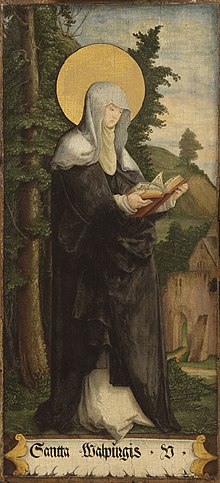St Walburga
| Saint Walpurga | |
|---|---|

Painting by the Master of Meßkirch, c. 1535–40.
|
|
| Born | c. 710 Devon |
| Died | 25 February 777 or 779 Heidenheim (Mittelfranken) |
| Venerated in |
Roman Catholic Church Eastern Orthodox Church |
| Canonized | 870 by Adrian II |
| Feast | Various days |
| Patronage | Eichstätt, Antwerp and other towns |
Saint Walpurga or Walburga (Old English: Wealdburg, Latin: Valpurga, Walpurga, Walpurgis; c. AD 710 – 25 February 777 or 779), also spelled Valderburg or Guibor, was an Anglo-Saxon missionary to the Frankish Empire. She was canonized on 1 May ca. 870 by Pope Adrian II. Walpurgis Night (or "Walpurgisnacht") is the name for the eve of her day, which coincides with May Day.
Walpurga was born in the county of Devonshire, England, into a local aristocratic family. She was the daughter of St. Richard the Pilgrim, one of the underkings of the West Saxons, and of Winna, sister of St. Boniface, Apostle of Germany, and had two brothers, St. Willibald and St. Winibald. Saint Richard is buried in the Basilica of San Frediano, Lucca, where he died on pilgrimage in 722. Saint Richard is also known as Richard the Saxon Pilgrim, of Droitwich.
St. Richard, when starting with his two sons on a pilgrimage to the Holy Land, entrusted Walpurga, then 11 years old, to the abbess of Wimborne. Walpurga was educated by the nuns of Wimborne Abbey, Dorset, where she spent 26 years as a member of the community. She then travelled with her brothers, Willibald and Winebald, to Francia (now Württemberg and Franconia) to assist Saint Boniface, her mother's brother, in evangelizing among the still-pagan Germans. Because of her rigorous training, she was able to write her brother Winibald's vita and an account in Latin of his travels in Palestine. As a result, she is often called the first female author of both England and Germany.
...
Wikipedia
